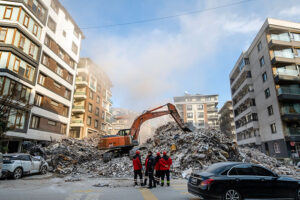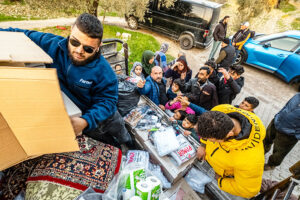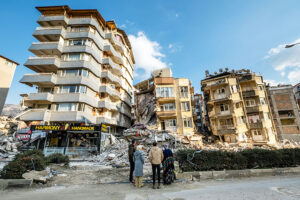
A rescue crew digs through the rubble of a collapsed apartment building in southeastern Turkey while looking for survivors and bodies after the earthquake of Feb. 6, 2023. — IMB photo
For Syrians, the world has been crumbling for years, and this February’s earthquakes added mounds to the existing literal and figurative rubble of a nation torn apart by the internal strife of civil war.
“The people of Syria have been so broken by war and the desperate situation there for over a decade now,” said Raleigh Clements, who has served with the IMB for 13 years. “This just compounded on an already desperate situation.”
Evie Tucker, who also serves with the IMB, said many Syrians say the earthquakes, two in one hour, were worse than the war. They knew the war was coming, and while they didn’t have long to prepare, most had the option of deciding whether to stay or leave and could take some of their possessions. The earthquakes struck with no warning and in the middle of the night. Tucker said men, women and children poured out of apartment buildings in their pajamas — in the pouring rain. Many, if not most, had to leave without their ID cards.
Tucker said her Syrian refugee friends face hopelessness. Some have been displaced from their homeland for 10 years and struggle to build a life for themselves. The thought of having to move and start over yet again is daunting. Syrians who live in cities farther away from the earthquake’s epicenter have welcomed into their homes family members who had to relocate. Receiving their family members was emotionally difficult.
“You’ve got traumatized people receiving traumatized people, and everybody is being retraumatized,” Tucker said. “How much more can these people take?”
In Syria, without the proper infrastructure or machinery, many people dig through the rubble with their bare hands — the concrete, glass and debris wedging under their fingernails. Political sanctions also complicate relief efforts as well as bans on bringing and using U.S. dollars in the country.

Send Relief partners distribute blankets, clothes and basic supplies to Syrian refugees in southern Turkey in the days following the Feb.6 earthquake. — IMB photo
An estimated four million Syrians live in Turkey — where the earthquakes toppled buildings and lives. Devastation in Turkey was more extensive, but more international relief organizations are responding. The ease of entry into Turkey and the developed infrastructure makes recovery and relief efforts much easier for international relief organizations. In Syria, this has not been the case.
Send Relief projects, made possible through the generosity of Southern Baptists, are underway and are ongoing across the region. Clements and Send Relief staff estimate around 500,000 Syrians have been displaced because of the earthquakes.
In addition to meeting physical needs, Clements hopes to institute a long-term mental health program that will help people cope with their trauma and work through the suffering they’ve experienced. The hope is for Christians in Syria to receive training online or by traveling to a more open country.
Three hundred thousand Syrian refugees live in the area where the Clements live. This statistic reflects pre-war numbers. The couple has an active ministry among the refugees, and they are looking to employ similar strategies in the earthquake area and use existing connections.
Clements met with Syrian Christians when he visited a city devastated by the earthquakes. Shock was still written on everyone’s faces, but testimonies of God’s faithfulness were written on their hearts.
Clements asks for prayers for Syrians as they grapple with yet another tragedy. He asked Southern Baptists to pray God would be close to Syrians and comfort them.
Gideon moment
Tucker said a visit to the region reminded her of a war zone. She’s from Tennessee and is accustomed to the destruction tornadoes bring, but she was moved by the large swath of destruction that extends far past traditional tornado radiuses.
She walked past her favorite coffee shop to find it in shambles. The falafel shop she had enjoyed before is gone. She visited one city where 80 percent of the buildings will be leveled and rebuilt.
“What is the thing that the Lord is wanting to see happen among Syrians and how is He asking us to be a part of that?” Tucker is asking herself.

A Turkish family stands outside of their collapsed apartment building in the city center of Antakya, Turkey after the devastating Feb. 6, 2023, earthquake. — IMB photo
Tucker has made several trips to a heavily hit region to assess and meet needs. One of the trips was with a Send Relief team, and another with a Southern Baptist Disaster Response team. Her team works with national believers and local churches to support families and communities affected by the earthquake. Their aid comes in a variety of forms, including supplying food and tents and hosting volunteer teams who provide medical assessment and water filtration systems.
Her local partner is investing in remote villages that haven’t received much aid. The population of one of these villages is predominantly widows and their children.
Tucker said she and other Christians have had more meaningful spiritual conversations at a faster rate than usual.
Many of their conversations are punctuated by questions: “Why do you think God let this earthquake happen?” and “Is God punishing people?” and “Is He angry?” and “There are so many people who didn’t know the Lord before they died. Why did God let that happen?”
Tucker anticipates that, as they continue to follow up on the new relationships, they will move into deeper conversations.
Tucker met an elderly woman staying in a tent in the courtyard of a church. The woman was afraid to sleep because she feared there might be another aftershock. She lost her husband in the earthquake. Her children live abroad, and since she has no paperwork or IDs, she is unable to travel to them. Full of emotion, she told Tucker she felt alone. Tucker shared how God promises He will never leave or forsake her, and He loves her and sees her, even though she feels alone. The women prayed together and the woman left feeling encouraged.
She’s heard stories of Syrian Christians who received family members who evacuated from the earthquake zone and have shared the gospel with their non-Christian relatives.
Tucker said her team is experiencing a Gideon-like seasons where, like Gideon in the Bible, God decreased their numbers. In Judges 7, God instructed Gideon to reduce the number of men in his army.
“Our team has gotten really small in this season where the work around us is almost limitless, and so that has been a real testing point for our team to trust the Lord,” Tucker said.
She’s cried out to the Lord, saying, “You knew that this earthquake was going to happen, and You knew that our team is going be the size that it is right now.”
The night before the earthquake, Tucker re-read through a Bible study for a leadership training program. She read a section encouraging the reader to “pray to the Lord, ask Him to show you where He’s working and where He’s calling you to join Him in the work.”
The next morning, she received word of the earthquake. While it has been overwhelming, this assurance from the Lord helped carry her through this season. A reduction in her team led to a deeper partnership with local believers.
Tucker said she knows God has her exactly where He wants her. Her desire is that her team would serve Him and share hope and truth to those who are hurting and in need of a Savior. B&R Some names have been changed for security.
